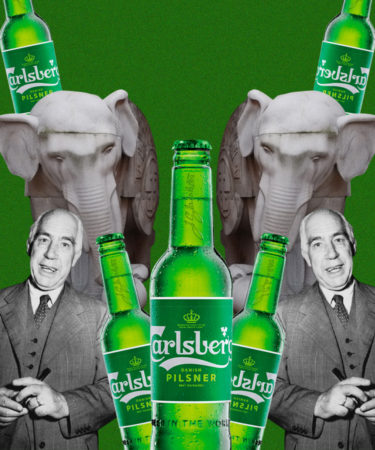It’s a work benefit for the ages: Niels Bohr, the Danish physicist who won the 1922 Nobel Prize in Physics and helped to develop the world’s first atomic bomb as a part of the Manhattan Project, had a long and illustrious career in science. As a reward for his hard work, Denmark’s Carlsberg Brewery gifted Bohr a home complete with a pipeline that pumped fresh beer directly into his residence.
It’s a great story, and one that has been reported on by publications such as Forbes and The Guardian, and seems like an appropriately epic reward for someone who helped to build our foundational knowledge of how the universe operates. The only problem with the story is that it isn’t entirely true.
“[T]he Bohr ‘beer tap story’ is an urban myth or, at best, a joke by some of his contemporaries,” Dr. Christian Joas writes VinePair in an email, adding, “and I do know a little bit about Niels Bohr.” Joas is the director of the Niels Bohr Archive, and an associate professor in the Department of Science Education at the University of Copenhagen.
“In the 1930s, beer would probably have tasted stale after traversing a pipeline of several dozens of meters or more,” Joas explains. “There was no such pipeline, but indeed Niels Bohr was entitled to free delivery of beer in the form of kegs and bottles/crates from 1932 to 1962.”
According to Joas, Bohr moved into the Carlsberg Honorary Residence in 1932. The palatial mansion was originally built for Jacob Christian Jacobsen, the founder of Carlsberg brewery. While the grand residence wasn’t exactly gifted to him, Bohr was granted the lifetime right to live there, which he did until his death in 1962.
Another apocryphal story about Bohr is that, after moving into the Carlsberg home, a brewery employee “stopped by and asked how much beer Bohr wanted to get delivered every day. Bohr said ‘12,’” meaning bottles. “Carlsberg of course delivered 12 crates of beer each day for a short while, until the misunderstanding was cleared up,” Joas says. However, this, too, is likely a myth.
As for the origins of the beer pipeline story, the charismatic Dr. Martyn Poliakoff, a research professor of chemistry at the University of Nottingham who hosts the YouTube show “Periodic Videos,” seems to be the culprit. In a video first posted in 2011, Poliakoff discusses the origins of the periodic element “Bohrium” (named for Niels Bohr), and provides the premise of the urban legend. When contacted via email with a question about the story’s origin, Poliakoff responded that he believes it came from Richard Rhodes’ book, “The Making of the Atomic Bomb.”
An examination of the book reveals that it does not contain any such detail, suggesting that Poliakoff either learned of the legend from another source, or that the story of Niels Bohr’s personal pipeline was an act of embellishment from a creative storyteller. Either way, the tale has become part of Bohr’s legacy and is a fun (if inaccurate) footnote in the life of a remarkable scientist.
